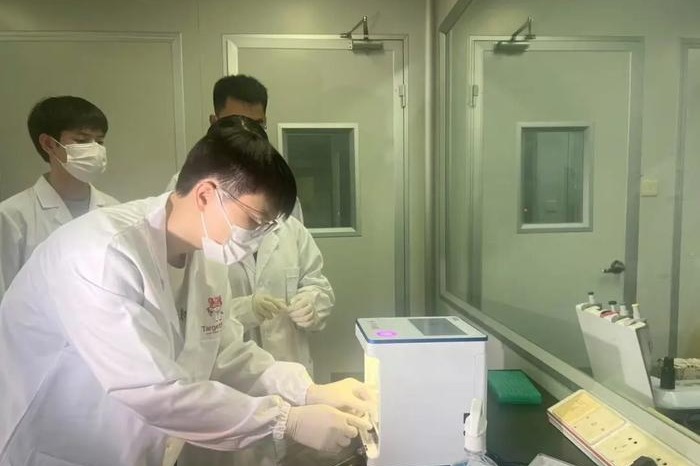Experts optimistic Huawei can face storm
Shenzhen-based technology giant has sufficient product stockpile and other contingency plans to deal with situation

Following recent measures taken by the United States government against Huawei Technologies Co, many have been increasingly pessimistic about the Chinese company's future.
But closer observation from industry analysts shows that the fallout of Washington's latest chip ban will not be as damaging as intended, and Huawei has an opportunity to turn its fortunes around.
To begin with, it still remains a question as to how the US government might carry out such broad restrictions in reality-moves which could involve hundreds of chip companies around the world-and such actions will heavily disrupt the global semiconductor supply chain, experts said.
Meanwhile, Huawei has a certain inventory level of chips, which will give it time to come up with contingency plans based on its research and development prowess as well as assess the progress of domestic semiconductor companies, experts said.
The US government is also facing mounting pressure from the country's own semiconductor association and chip companies. This may force it to leave open the possibility of reprieve for certain US suppliers, experts said, adding that China's promise to utilize "necessary "measures to protect Chinese interests will also exert heavier pressure on the US side.
The comments came after the US Commerce Department issued new rules to tighten restrictions on Huawei by limiting the Shenzhen, Guangdong province-based firm's access to chip components produced by non-US companies using US technology. It also added another 38 Huawei affiliates to its blacklist.
Roger Sheng, vice-president of research at global consultancy Gartner Inc, said before considering the ban's possible impact on Huawei, a key question needing to be asked is whether the US government's long-arm jurisdiction can really cover all chip companies around the world.
"It is almost impossible for the US government to monitor and track all chip companies' business in reality," Sheng said.
The latest tightening ban demonstrates how far the US government will go to crack down on private companies, and runs the risk of displeasing companies from other countries.
"If Huawei is done, who will be next? Dozens of Chinese tech companies that have already been put on the US government blacklist? Or any non-US technology pioneers? They will meet the same fate of Huawei if companies remain silent this time," said a senior executive from a Chinese technology company.
Also, even if suppliers around the world can endure the revenue losses resulting from a ban of providing chip products and services to Huawei, they will not put up with Washington going further and banning all major Chinese tech players, the senior executive added.
"That is a huge loss nobody can bear. As a result, the key is that chip suppliers around the world should stand up and defy Washington's latest ban on Huawei. It is the only way to prevent the US government from exercising more interference against normal global business operations. Concern is not enough. It is time for action," the executive added.
Signs of such a trend are already visible.
The Wall Street Journal reported that Qualcomm is lobbying the US government to revoke restrictions on the sale of components to Chinese companies, including Huawei. The US restrictions have cost Qualcomm a market worth as much as $8 billion annually, the US company said.
In response to the latest ban, John Neuffer, president and CEO of the US Semiconductor Industry Association-an organization that represents 95 percent of the US semiconductor industry-said: "These broad restrictions on commercial chip sales will bring significant disruption to the US semiconductor industry."
Neuffer said in a statement that the association is surprised and concerned by the administration's sudden shift from its prior support of a more narrow approach intended to achieve stated national security goals while limiting the harm to US companies.
"We reiterate our view that sales of nonsensitive, commercial products to China drive semiconductor research and innovation here in the US, which is critical to America's economic strength and national security," he added.
Boston Consulting Group said in a report that if the US government increases restrictions on semiconductor trade with China, this could endanger the country's own position as a leader in the sector.
BCG warned that if shipments of US chips and chipmaking equipment to China were stopped, and China were to ban imports of US electronics and software, it could cost US companies 37 percent of their annual sales.
BCG found that top US semiconductor makers have reported a median revenue decline of between 4 percent and 9 percent in each of the three quarters following the ban on Huawei buying US chip technologies in May 2019.
Wang Peng, deputy head of the China Center for Information Industry Development, said: "As the coronavirus outbreak is severely disrupting global supply and industrial chains, the US government's actions will further destroy and hit the current system."
Some experts said that given mounting pressure within the US, Washington might allow certain domestic suppliers, such as Qualcomm, to continue selling chips to Huawei after the November presidential election.
Also, Huawei still has time to come up with contingency plans for the latest ban. Analysts estimated that the world's largest telecom equipment maker has a stockpile of processors for smartphones and 5G base stations that could last at least until early 2021, with some even pointing to end-2021.
To cope with restrictions, Huawei said earlier that its R&D spending grew 29.8 percent to 131.7 billion yuan ($19 billion) in 2019, while inventories of components surged 73.4 percent on a yearly basis.
"Such a time window can give Huawei some wiggle room," said Xiang Ligang, director-general of the Information Consumption Alliance, a telecom industry association.
The "final card" from the US will unlikely pose an existential threat to Huawei, which had global sales revenue of 454 billion yuan in the first half, despite the potentially profound disruptions it might bring, Xiang said.
According to a post on Chinese social media platform Sina Weibo, Huawei recently launched its Tashan Project to partner with domestic companies to build a US-technology-free chip production line. Though Huawei did not confirm this decision, people familiar with the matter told China Daily that the company is seriously considering doing so.
Foreign Ministry spokesman Zhao Lijian criticized the US' latest move with a lengthy scathing statement that calls the US move a "naked act of hegemony", during a recent news briefing.
"We urge the US to immediately correct their wrongdoing, stop slandering and smearing China and halt cracking down on Chinese companies. The Chinese government will continue to take necessary measures to protect the legitimate rights and interests of Chinese companies," Zhao said.


Today's Top News
- China holds 2nd rehearsal for event marking 80th anniversary of victory over Japanese aggression, fascism
- Foreign athletes embrace culture, innovation at Chengdu World Games
- Meet again? Putin says: Next time in Moscow
- Zelensky to meet Trump in Washington on Monday
- Wang Yi to visit India from Monday
- Trump, Putin tout 'productive' Alaska talks without apparent breakthrough






























